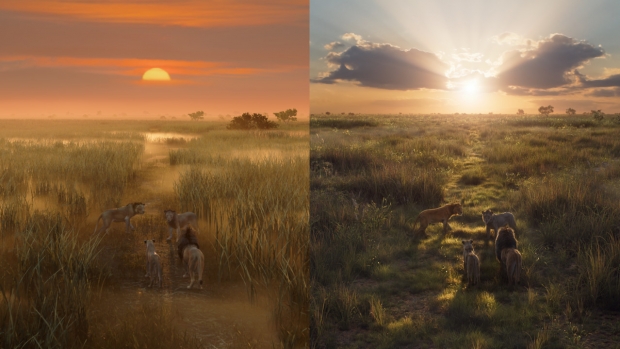The VFX and animation studio led a team of over 1,700 artists, technologists, and production crew across 4 continents, collaborating remotely as well as using VR and virtual production tools to navigate digital environments.

‘Mufasa: The Lion King,’ now playing in theaters. Before and after images courtesy of MPC, © 2024 Disney Enterprises, Inc. All Rights Reserved.
VFX and animation studio MPC brought Disney's characters and the African savannah to life in the recently released CG feature Mufasa: The Lion King. Under the leadership of director Barry Jenkins, the studio blended artistry and leading-edge technology to capture the story's heart and soul.
Production VFX supervisor Adam Valdez, animation supervisor Daniel Fotheringham, VFX producer Barry St. John, VFX supervisor Audrey Ferrara, and VFX producers Georgie Duncan and Benny Milligan led a team of over 1,700 artists, technologists, and production crew across four continents.
The film’s production leveraged innovative tools and techniques, including virtual production and motion-capture during pre-production. Despite COVID-19 restrictions, the team collaborated remotely across London, New York, and Los Angeles, using VR to navigate digital environments. For many of the movie’s sequences the movements of motion-capture performers were mapped onto digital animals. Jenkins was able to direct performances live using Unreal Engine real-time animated feeds.





“To create a blueprint for our final animation our motion capture shoot involved multiple performers playing Mufasa, Sarabi, Taka, Rafiki and even Zazu” says Valdez. “They wore motion capture suits, and through a process we call ‘QuadCap,’ their movements were mapped onto digital lion characters. This technology aligned the performers’ head and spine movements to the lion’s head and neck, their legs to the lion’s front legs, and simulated the lion’s back legs and hips to follow. Barry could then watch a live feed of the lions on screen through Unreal Engine, allowing him to give real-time performance and camera notes to the actors and DP.”
“We added facial expressions and lip sync to enhance characters performances.” Fotheringham noted, “then Barry could ‘walk through’ the recorded sequence in VR making notes before we could wrap it up to be shot virtually. Performances with complex animal mechanics, like fighting or leaping were then integrated into the Quadcap performances and into the virtual sets, creating a complete ‘master scene’ that Barry and James could shoot from any angle.” This innovative blending of live-action filmmaking techniques and visual effects became a defining feature of the entire production.
MPC’s Character Lab team crafted over 118 photorealistic unique animals, each built from the ground up using anatomically precise bone and muscle structure. MPC’s proprietary grooming system, Loma, created lifelike fur with an unprecedented number of hairs that could react naturally to environmental elements like snow, wind and water. Meanwhile, MPC’s animators delivered performances rich in emotional depth and authenticity.
The studio’s Environment artists crafted expansive African landscapes through scouting trips, photogrammetry, and hand-sculpting. They designed plains, canyons, and forests, capturing every detail from weathered rocks to blades of grass. To manage the vast scale, they developed a 107 square-mile digital world, rendered with photorealistic detail.
Source: MPC






















